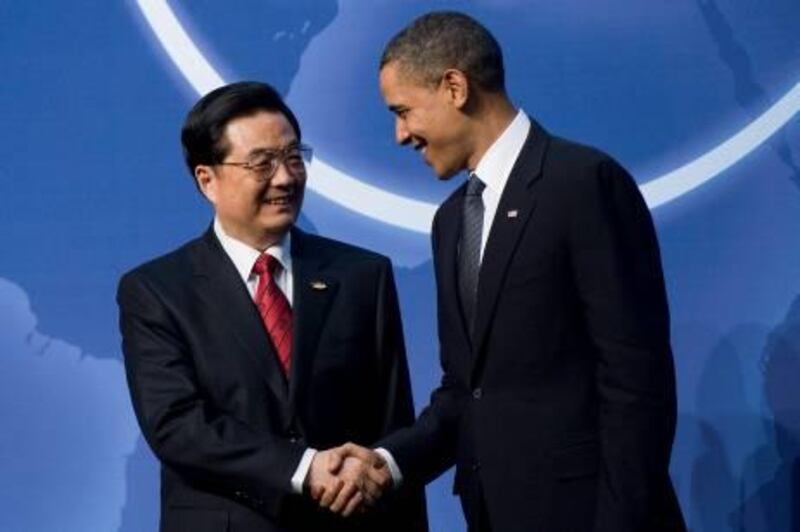BEIJING // The Chinese president, Hu Jintao, will have to marshall all of his negotiating skills tomorrow to keep at bay the US government, which is brandishing a shopping list of grievances.
Mr Hu and his delegation are likely to be "more on the defensive, trying to reassure the US on the questions that it raises", according to Joseph Cheng, a professor of political science at the City University of Hong Kong.
Currency reform, efforts to dismantle the North Korean nuclear programme and the aims behind China's military build-up are among the many subjects Washington might be hoping for clarification on from Beijing. Mr Hu, said Mr Cheng, has fewer "pressing questions" to raise than Barack Obama, the US president.
Yet, in an e-mail interview with The Washington Post and The Wall Street Journal published yesterday, Mr Hu indicated he may not be in the mood for giving ground, saying the countries should "respect each other's choice of development path".
While its list of grievances may be smaller, Beijing does have several issues it will probably want to focus on.
With the US having announced a US$6.4 billion (Dh23.51bn) arms deal with Taiwan a year ago, Washington's position regarding the self-ruled island, which Beijing considers part of its territory, could be a key subject.
Zhang Qingmin, a professor and US policy specialist at Peking University's centre for international and strategic studies, said: "When there is a meeting, the Taiwan issue will be a main issue from the Chinese side,
"The Chinese government will continue to say it is seriously upset on the selling of arms, and the US will have to handle this issue carefully."
The Taiwanese president, Ma Ying-jeou, said yesterday his administration would be "closely following" the summit, amid concerns over whether Taipei's purchase of the latest US fighter jets could be jeopardised.
However, Mr Zhang said the US will not change its "dual track" policy of providing arms to Taiwan with the aim of maintaining a military balance between the two sides, while endeavouring to further develop Sino-US relations.
China is also likely to press its view that restarting the stalled six-party talks is the best way to deal with the North Korean nuclear issue and will seek a "more enthusiastic" response from the US, Mr Cheng said.
The value of the Chinese currency has been a source of tension between the two sides over the past year, with some US legislators calling for China to be branded a "currency manipulator" for maintaining the value of the yuan at a low level to boost exports.
While the currency remains a problematic issue, the US "has shifted a lot of its emphasis", said Patrick Chovanec, an associate professor of practice at the school of economics and management at Tsinghua University in Beijing, and who has served as an aide to John Boehner, now the speaker of the US House of Representatives.
"Increasingly, due in part from the feedback from the American business community investing and working in China, the emphasis has shifted to market access, including intellectual property protection, including non-tariff barriers like indigenous innovation policies," he said.
These indigenous innovation rules, which favour Chinese interests in government procurement, have been the subject of repeated complaints from US and other foreign business interests.
Mr Hu insisted yesterday that China would "continue to improve laws and regulations concerning foreign investment", although Mr Chovanec cautioned that with many issues in China it was a case of implementation, rather than laws being passed, that mattered.
The yuan issue "may end up resolving itself", Mr Chovanec said, as China may decide to move further away from currency controls to contain rampant inflation. Alternatively, if it does not revalue significantly, and inflation continues apace, its competitive advantage will be reduced in any case.
"One way or another, China is going to be more expensive relative to the rest of the world," Mr Chovanec said.
Perhaps indicating a softer stance on the issue, the US treasury secretary, Timothy Geithner, said last week that the yuan had already undergone "a very substantial, meaningful shift".
China has its own financial and trade-related gripes to raise, including encouraging the US to relax controls on the export of high-tech products.
"It's in the interests of both countries if the US can [increase] its high-tech exports to China," said Frank Song, a professor at the University of Hong Kong's school of economics and finance.
Beijing is also concerned by the US Federal Reserve's "quantitative easing" plan to create money to purchase $600bn of government bonds, as this could affect the value of China's holdings of US government debt. Mr Hu said this week "the liquidity of the US dollar should be kept at a reasonable and stable level".






